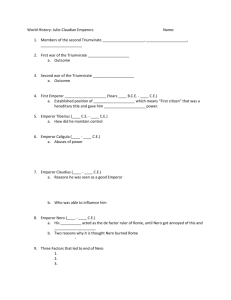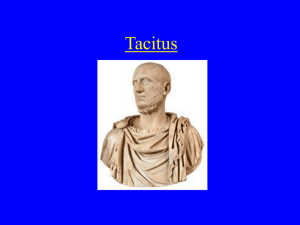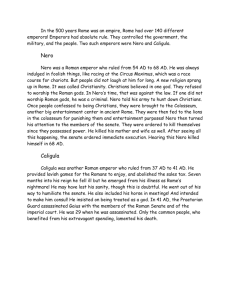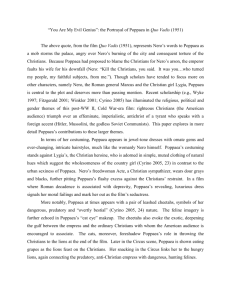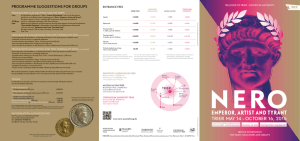NERO By Mark Moore 1. Nero Claudius Caesar Germanicus was
advertisement
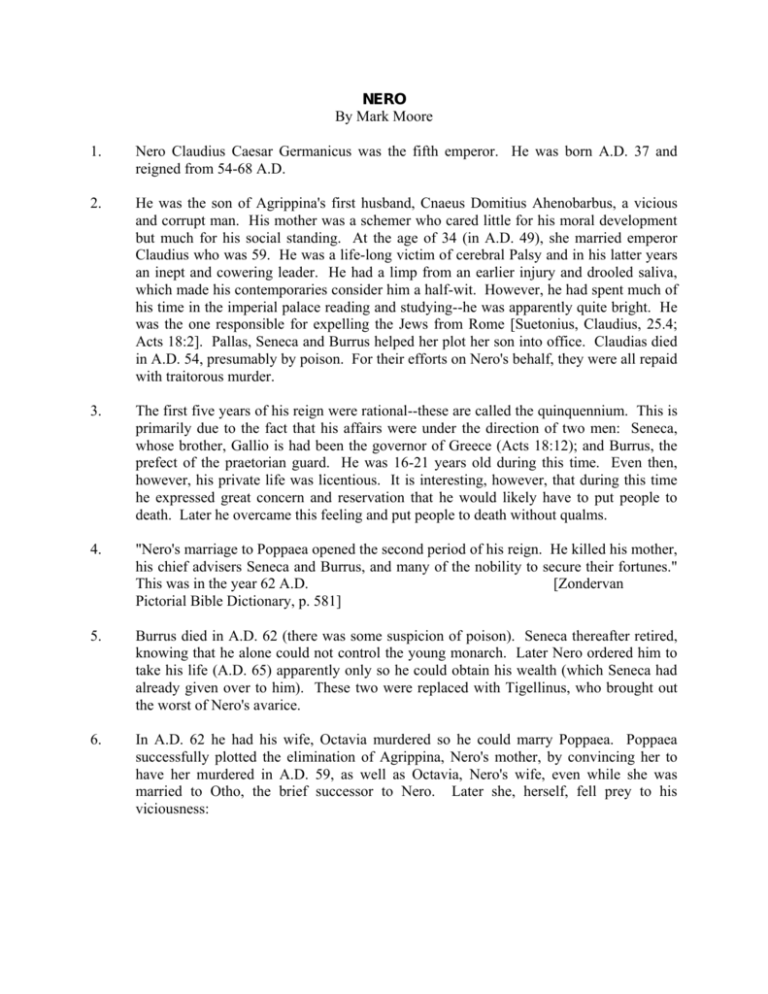
NERO By Mark Moore 1. Nero Claudius Caesar Germanicus was the fifth emperor. He was born A.D. 37 and reigned from 54-68 A.D. 2. He was the son of Agrippina's first husband, Cnaeus Domitius Ahenobarbus, a vicious and corrupt man. His mother was a schemer who cared little for his moral development but much for his social standing. At the age of 34 (in A.D. 49), she married emperor Claudius who was 59. He was a life-long victim of cerebral Palsy and in his latter years an inept and cowering leader. He had a limp from an earlier injury and drooled saliva, which made his contemporaries consider him a half-wit. However, he had spent much of his time in the imperial palace reading and studying--he was apparently quite bright. He was the one responsible for expelling the Jews from Rome [Suetonius, Claudius, 25.4; Acts 18:2]. Pallas, Seneca and Burrus helped her plot her son into office. Claudias died in A.D. 54, presumably by poison. For their efforts on Nero's behalf, they were all repaid with traitorous murder. 3. The first five years of his reign were rational--these are called the quinquennium. This is primarily due to the fact that his affairs were under the direction of two men: Seneca, whose brother, Gallio is had been the governor of Greece (Acts 18:12); and Burrus, the prefect of the praetorian guard. He was 16-21 years old during this time. Even then, however, his private life was licentious. It is interesting, however, that during this time he expressed great concern and reservation that he would likely have to put people to death. Later he overcame this feeling and put people to death without qualms. 4. "Nero's marriage to Poppaea opened the second period of his reign. He killed his mother, his chief advisers Seneca and Burrus, and many of the nobility to secure their fortunes." This was in the year 62 A.D. [Zondervan Pictorial Bible Dictionary, p. 581] 5. Burrus died in A.D. 62 (there was some suspicion of poison). Seneca thereafter retired, knowing that he alone could not control the young monarch. Later Nero ordered him to take his life (A.D. 65) apparently only so he could obtain his wealth (which Seneca had already given over to him). These two were replaced with Tigellinus, who brought out the worst of Nero's avarice. 6. In A.D. 62 he had his wife, Octavia murdered so he could marry Poppaea. Poppaea successfully plotted the elimination of Agrippina, Nero's mother, by convincing her to have her murdered in A.D. 59, as well as Octavia, Nero's wife, even while she was married to Otho, the brief successor to Nero. Later she, herself, fell prey to his viciousness: "Having killed Poppaea by a kick when she was with child, (A.D. 66), Nero proposed to marry Antonia, his adopted sister, and on her refusal ordered her to be put to death. He then married Statilia Messalina, whose husband Vestinus he had assassinated for marrying Messalina after the emperor had cohabited with her." [Baker's Bible Dictionary, p. 789] 7. It was during this time (c. A.D. 63) that Paul made his defense before him (Acts 25:1011). 8. In A.D. 64 a large section of Rome was destroyed by fire. Many suspected Nero of starting the conflagration, including the historian Tacitus. He needed a scapegoat for the mishap and found it in the Christians of Rome. Tacitus, certainly no friend of the church, said this about the persecuted Christians: "Their death was made a matter of sport; they were covered in wild beast's skins and torn to pieces by dogs; or were fastened to crosses and set on fire in order to serve as torches by night . . . Nero had offered his gardens for the spectacle and gave an exhibition in his circus, mingling with the crowd in the guise of a charioteer or mounted on his chariot. Hence, . . . there arose a feeling of pity, because it was felt that they were being sacrificed not for the common good, but to gratify the savagery of one m an.” [Tacitus, Annals, XV, 44] 9. Nero was the first to enact official Roman persecution against the church. Both Peter and Paul suffered martyrdom under his hand. 10. His private life was full of scandal. He entertained himself with the basest forms of depredation including murder, homosexuality, sadomasochism, and unimaginable violence. 11. Conspiracies dogged his later years. He was advised to take his own life but he did not have the courage to do it. The senate, in fact, decreed his death. His final traitorous act was to put many of the senators to death. Finally, on June 9, A.D. 68, he took his own life. His final words were these, "What an Artist dies in me." (He fancied himself a musician and artist and athlete). Thus died the last of the line of Julius Caesar. BIBLIOGRAPHY: -Ferguson, Everett. Backgrounds of Early Christianity, Grand Rapids: Eerdmans, 1987, pp. 26-28. -Grant, Michael. Nero. London, 1957. -Griffin, M. Nero: The End of a Dynasty. New Haven, 1985. -Walter, G. (ed). Nero. London, 1970. -Warmington, B. H. Nero: Reality and Legend. London, 1969.


